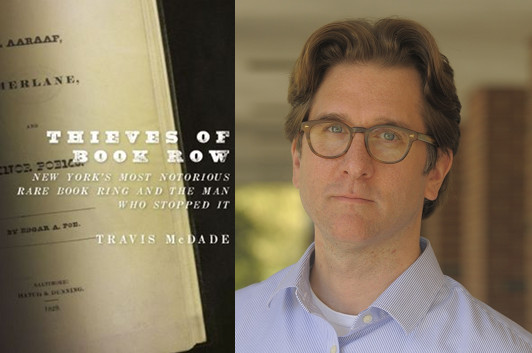Read This: Thieves of Book Row

photo via Travis McDade
Recently, I did an interview for Shelf Awareness with Illinois law professor Travis McDade about Thieves of Book Row, his history of how the New York Public Library (among other institutions) took on a network of professional book thieves that targeted libraries across the northeastern United States, filching early Americana and other important first editions, often selling them to Manhattan book dealers. There’s a lot to talk about in this book—more, in fact, than I could fit into the Shelf Q&A. So here’s a bonus excerpt from our exchanges…
You’ve written that “getting away with [book theft] is harder than ever” today. A century ago, how seriously did the criminal justice system treat theft from libraries?
Everything I’ve written, and am writing, has punishment as a component—not surprising since I come at this from the legal perspective first, and the special collections perspective second. So I think about this a lot, and it’s more complicated than people think. It has always been, and remains, a question of getting the authorities to treat it seriously. In Thieves of Book Row I showed that, if libraries get a good prosecutor and an understanding judge, there will be significant punishment for these crimes. (Sing Sing prison!) Otherwise, it’s the traditional slap on the wrist. I’m happy to say that it is not as bad as it once was, but it is still true to an extent. Prosecutors have an incredible amount of discretion when it comes to these things. They need to be shown how important these books, documents, maps and manuscripts are. When that happens, we see good results. When it doesn’t, we get probation.
Another thing I show in the book is that the press, a hundred years ago, was a lot more draconian in its attitude toward these thieves. Newspapers, reflecting public sentiment, advocated punishments of the sort that—how shall I say this?—would not pass Eighth Amendment muster. By the latter part of the 20th century, on the other hand, newspapers routinely announced punishment for theft of extremely valuable books with a lame joke about library overdue fines, and just as routinely trotted out the canard that these thieves were suffering from bibliomania.
9 June 2013 | read this |
Life Stories #33: Alexandra Aldrich
This episode of Life Stories, the podcast series where I interview memoir writers about their lives and the art of writing memoir, features Alexandra Aldrich, the author of The Astor Orphan, a look back at the summer she was ten and living with her extended family at Rokeby, an estate in New York’s Dutchess County that’s been in the Astor and Livingston families for the last 11 generations… although, as she vividly recounts, the later generations had very little left of the “Astor fortune” except this sprawling home. It was a weird summer, much of that precipitated by her father, an Ivy League graduate who had no inclination or, really, aptitude for a traditional career—but no longer had the means to be an aristocratic gentleman. Yet, even as he’s scrounging up dented TV dinners from the nearby processing plant to feed young Alexandra, he’s putting his mistress up in another part of the compound…
We talk about that, and about Aldrich’s decision to focus on a very brief portion of what appears to be a remarkable life, and the inspiration she drew from James McBride’s The Color of Water… among a few other topics.
Listen to Life Stories #33: Alexandra Aldrich (MP3 file); or download this file directly by right-clicking (Mac users, option-click). You can also subscribe to Life Stories in iTunes, where you can catch up with earlier episodes and be alerted whenever a new one is released.
4 June 2013 | life stories |


 Our Endless and Proper Work is my new book with Belt Publishing about starting (and sticking to) a productive writing practice.
Our Endless and Proper Work is my new book with Belt Publishing about starting (and sticking to) a productive writing practice. 
